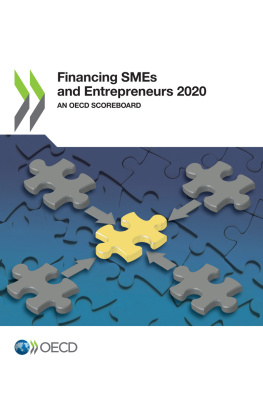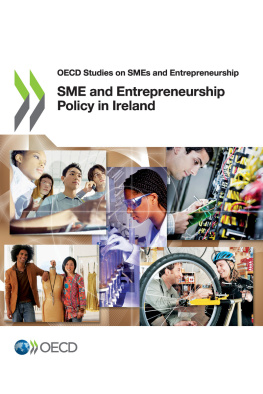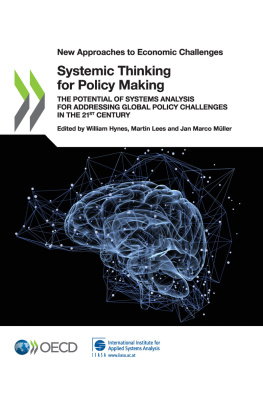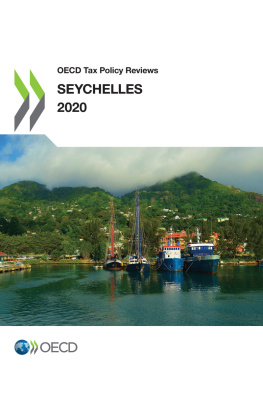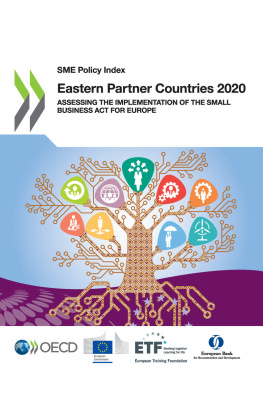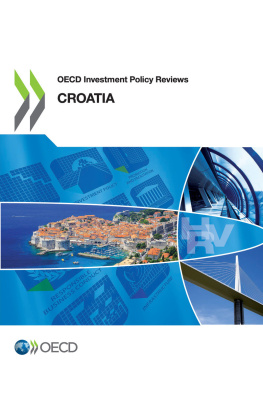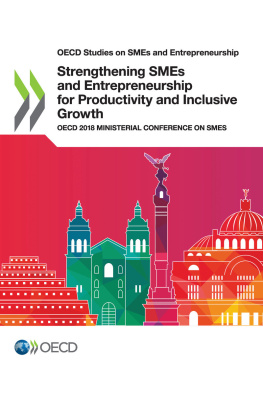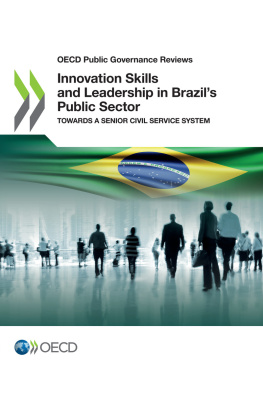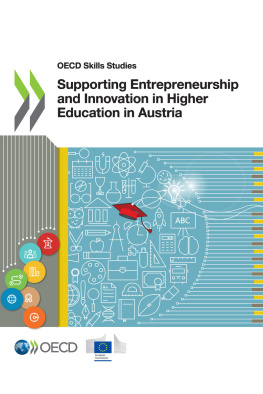OECD - SME and Entrepreneurship Policy in Brazil 2020
Here you can read online OECD - SME and Entrepreneurship Policy in Brazil 2020 full text of the book (entire story) in english for free. Download pdf and epub, get meaning, cover and reviews about this ebook. year: 2020, publisher: OECD Publishing, genre: Politics. Description of the work, (preface) as well as reviews are available. Best literature library LitArk.com created for fans of good reading and offers a wide selection of genres:
Romance novel
Science fiction
Adventure
Detective
Science
History
Home and family
Prose
Art
Politics
Computer
Non-fiction
Religion
Business
Children
Humor
Choose a favorite category and find really read worthwhile books. Enjoy immersion in the world of imagination, feel the emotions of the characters or learn something new for yourself, make an fascinating discovery.
SME and Entrepreneurship Policy in Brazil 2020: summary, description and annotation
We offer to read an annotation, description, summary or preface (depends on what the author of the book "SME and Entrepreneurship Policy in Brazil 2020" wrote himself). If you haven't found the necessary information about the book — write in the comments, we will try to find it.
OECD: author's other books
Who wrote SME and Entrepreneurship Policy in Brazil 2020? Find out the surname, the name of the author of the book and a list of all author's works by series.
SME and Entrepreneurship Policy in Brazil 2020 — read online for free the complete book (whole text) full work
Below is the text of the book, divided by pages. System saving the place of the last page read, allows you to conveniently read the book "SME and Entrepreneurship Policy in Brazil 2020" online for free, without having to search again every time where you left off. Put a bookmark, and you can go to the page where you finished reading at any time.
Font size:
Interval:
Bookmark:
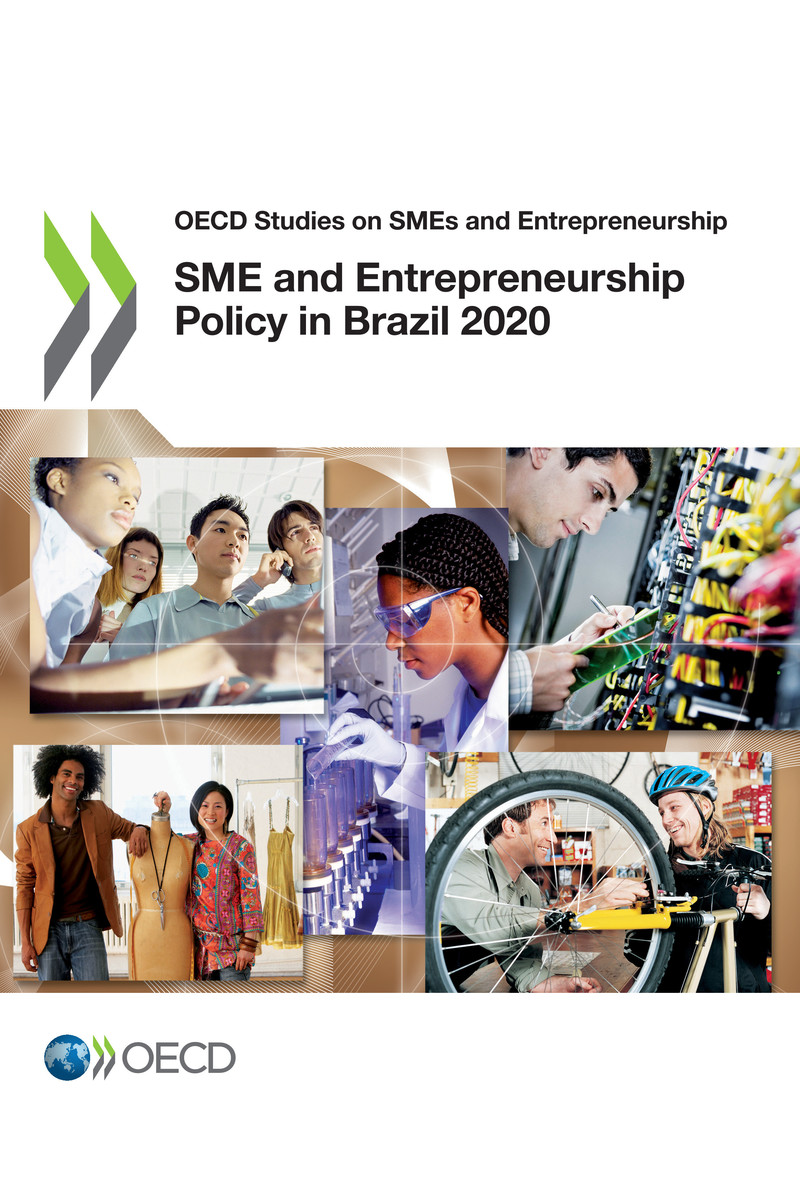
OECD (2020), SME and Entrepreneurship Policy in Brazil 2020 , OECD Studies on SMEs and Entrepreneurship, OECD Publishing, Paris, https://doi.org/10.1787/cc5feb81-en .
This publication presents the OECD country review of small- and medium-sized enterprise (SMEs) and entrepreneurship policy in Brazil. It was prepared at the request of the Brazilian Ministry of Industry, Foreign Trade and Services (MDIC), which was merged into a new and enlarged Ministry of Economy in early 2019. This publication is part of the series of OECD Country Reviews on SME and Entrepreneurship Policy undertaken by the OECD Centre for Entrepreneurship, SMEs, Regions and Cities (CFE). Previous country reviews have covered Canada, Indonesia, Ireland, Israel, Italy, Kazakhstan, Mexico, Poland, the Russian Federation and Thailand.
The series provides a tool for assessing the design and implementation of SME and entrepreneurship policy, identifying areas for improvement and sharing policy experiences among countries. The reports typically include one or two thematic chapters on issues of special relevance for the government, as agreed between the OECD and the country concerned. This review has two thematic chapters, one on SME export policies and one on the innovative start-up ecosystem.
The report shows that SMEs are critical for economic growth and social inclusion in Brazil, but that the gap in labour productivity between Brazilian SMEs and large companies is wider than in the OECD area. Brazil is also characterised by widespread business ownership, while growth-oriented entrepreneurship is much less common. The business environment presents some challenges for SMEs, for example with respect to the credit market, business regulations and taxation, although important reforms have recently been introduced in each of these areas. SME policy in Brazil rests on the principle of preferential treatment for micro and small businesses, which is enshrined in the Federal Constitution. Accordingly, the main federal policy for SMEs, Simples Nacional , consists of a preferential tax and regulatory regime for micro and small enterprises. There are also many targeted programmes for SMEs, some of which could be scaled up.
The report offers policy recommendations across a number of areas. Preferential tax regimes for micro and small enterprises could be tweaked within the context of a broader reform of the corporate tax system. Competition in the credit market could be strengthened through the further development of alternative domestic lenders, such as credit co-operatives. Government-backed loan guarantees could also be more actively promoted in the domestic credit market. More innovation policy spending could go to start-ups and SMEs by scaling up some successful programmes and by introducing adjustments to federal R&D tax credits. Export finance and supplier development programmes could receive more resources, while womens entrepreneurship would benefit from a larger number of programmes specifically aimed at women-owned businesses.
The OECD review series is based on a standard methodology, which includes a diagnostic questionnaire completed by national government authorities, a fact-finding mission by an OECD team to hold detailed interviews with policy and business stakeholders, and discussion of a draft report at a peer review session in the OECD Working Party on SMEs and Entrepreneurship (WPSMEE), which operates under the auspices of the Committee on Industry, Innovation and Entrepreneurship (CIIE). The report of the Brazil review was discussed by the WPSMEE in October 2019 and approved by written procedure in December 2019 [CFE/SME(2019)10].
This review was undertaken by the OECD Centre for Entrepreneurship, SMEs, Regions and Cities (CFE) led by Lamia Kamal-Chaoui, Director, in co-operation with the Brazilian Ministry of Industry, Foreign Trade and Services (MDIC), later merged into a new and enlarged Ministry of Economy.
The study was co-ordinated and edited by Marco Marchese (Policy Analyst, CFE). The report was drafted by a team involving Marco Marchese (main responsibility for Chapters 1 and 2 and parts of Chapters 3 and 5); Kris Boschmans (Policy Analyst, CFE main responsibility for Chapter 3 and parts of Chapter 5); Marco Bianchini (Policy Analyst, CFE main responsibility for Chapter 8 and parts of Chapter 5); Lois Stevenson (independent consultant main responsibility for Chapter 6); Ricardo Arroja (independent consultant main responsibility for Chapter 7); Amanda Bullough (University of Delaware main responsibility for parts of Chapter 5); and Roseli Alves (seconded staff from Brazils Ministry of Economy main responsibility for Chapter 4). Additional written inputs were prepared by Erika Soki (Intern, CFE), while statistical support was provided by Thanh Tran (Junior Policy Analyst, CFE). Anne Legendre (Statistician, Economics Department) prepared the Basic Statistics of Brazil page. Heather Mortimer Charoy (Assistant, CFE) provided project support.
The report benefited from comments of the members of the Steering Group of the review, who also provided written inputs in the form of good-practice policy examples (international learning models) from their own respective countries. The members of the Steering Group were Deborah Matthews and Peter Whittington (Department for Business, Energy and Industrial Strategy, United Kingdom), Ana Costa Paula (Ministry of Economy, Portugal), and Tanja Wulf (Federal Ministry for Economic Affairs and Energy, Germany). Jens Arnold (Head of the Country Desk of Argentina and Brazil, OECD Economics Department) and Miriam Koreen (Senior Counsellor, CFE) also provided valuable comments to the report.
This report could not have been drafted without the support and continued engagement of key stakeholders from Brazil. Numerous individuals from government organisations, associations, academics, think tanks and other institutions provided vital information and feedback throughout the drafting process. Their assistance during the kick-off and fact-finding missions, the detailed information submitted through the questionnaire, and constructive comments on earlier draft versions of this report proved crucial to the finalisation of this study. Special thanks are reserved for Jos Ricardo de Freitas Martins da Veiga (former Secretary for Micro and Small Businesses, Federal Government of Brazil) and Patricia Lima Favaretto (Trade Analyst, Federal Government of Brazil) for providing tireless support throughout most of the project duration. Liliane Trinidade de Sousa (Trade Analyst, Federal Government of Brazil), Pabline Arajo Reis (Trade Analyst, Federal Government of Brazil), Jorge Hargrave (Programme Director, Federal Government of Brazil) and Juliana Natrielli (Sub-Secretary for Micro and Small Businesses, Federal Government of Brazil) also supported the project at different stages.
Font size:
Interval:
Bookmark:
Similar books «SME and Entrepreneurship Policy in Brazil 2020»
Look at similar books to SME and Entrepreneurship Policy in Brazil 2020. We have selected literature similar in name and meaning in the hope of providing readers with more options to find new, interesting, not yet read works.
Discussion, reviews of the book SME and Entrepreneurship Policy in Brazil 2020 and just readers' own opinions. Leave your comments, write what you think about the work, its meaning or the main characters. Specify what exactly you liked and what you didn't like, and why you think so.







